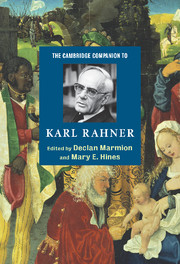Book contents
- Frontmatter
- Introduction
- Part I Spiritual, Philosophical, and Theological Roots
- Part II Theological Investigations
- 4 Method in theology
- 5 Revelation and faith
- 6 Trinity
- 7 Christology
- 8 Ecclesiology and ecumenism
- 9 Ministry and worship
- 10 Ethics
- 11 Eschatology
- Part III Conversations Ongoing
- Part IV Retrospect and Prospect
- Appendix
- Index
5 - Revelation and faith
from Part II - Theological Investigations
Published online by Cambridge University Press: 28 May 2006
- Frontmatter
- Introduction
- Part I Spiritual, Philosophical, and Theological Roots
- Part II Theological Investigations
- 4 Method in theology
- 5 Revelation and faith
- 6 Trinity
- 7 Christology
- 8 Ecclesiology and ecumenism
- 9 Ministry and worship
- 10 Ethics
- 11 Eschatology
- Part III Conversations Ongoing
- Part IV Retrospect and Prospect
- Appendix
- Index
Summary
Revelation and its correlative, faith, were at the heart of Karl Rahner's life and work. As a priest and theologian, his major concern was ultimately a pastoral one, that of helping people to come to faith, to deepen their faith, to make it a life-enhancing, life-directing force in their lives. His focus was on both the content of faith and the existential appropriation of that content in the lived response of believers to it, on fides quae and fides qua.
When Rahner began his theological career issues of revelation and faith tended to be addressed primarily within the context of fundamental theology and its preoccupation with apologetics. Although new and creative developments were beginning to be made in this area, the neo-scholastic approach remained dominant. Described as a form of extrinsicism, its concern was to establish the possibility and credibility of a historical revelation by God in the history of Israel and especially in the person of Jesus. Particular emphasis was given to miracles and the fulfillment of prophecy as divine endorsement of the claims of Jesus. A further task of this kind of apologetics was to show that Jesus instituted the Church and entrusted to its teaching authority the content of revelation. The method of argumentation remained on what might be called the formal level in that it was intent on establishing the fact of revelation and the formal structures by which that revelation is handed on in the Church. No consideration was given to the content of revelation or to the actual situation of those to whom the gospel was to be preached.
- Type
- Chapter
- Information
- The Cambridge Companion to Karl Rahner , pp. 83 - 97Publisher: Cambridge University PressPrint publication year: 2005
- 1
- Cited by

